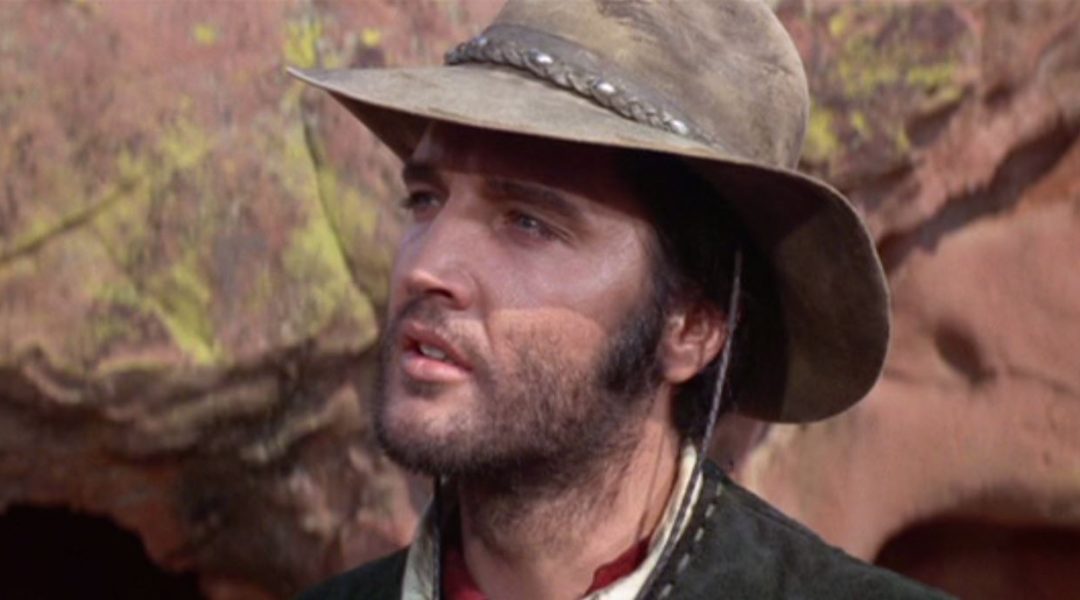The King rode tall in movies where he played cowboys and/or Indians.
Elvis Presley passed away 46 years ago in 2023 — August 16, 1977, to be precise — at the absurdly young age of 42. But at Cowboys & Indians, we prefer to celebrate lives rather than mourn deaths. And so, with that in mind, we took another look at four movies — each one available on various streaming platforms — in which The King ruled as either a Wild West protagonist or a rodeo star.
LOVE ME TENDER (1956)
Elvis made a promising movie debut in director Robert D. Webb’s post-Civil War western as Clint Reno, a Texas homesteader who marries his brother’s sweetheart (Debra Paget) after receiving reports that his sibling, Vance Reno, was killed while fighting for the Confederacy. Unfortunately, Clint discovers those reports were greatly exaggerated when Vance (Richard Egan) comes marching home. Even more unfortunately, while Vance nobly struggles to accept the loss of his love, Clint is driven to extremes by jealousy. Nothing good comes of this. Egan is the top-billed star here, but Elvis is the one who drew hordes of young fans to the box-office. And when many of those young fans objected to the death of their idol’s character after viewing the film at preview screenings, the filmmakers superimposed a shot of Elvis strumming his guitar and singing the title song over the final graveside scene.
FLAMING STAR (1960)
Widely viewed by critics and fans as one of The King’ very best star vehicles, director Don Siegel’s potent period drama is propelled by Elvis’ effective and affecting performance as Pacer Burton, the son of a Texas rancher (John McIntyre) and a Kiowa mother (Dolores del Rio). Pacer finds himself torn between two cultures when a neighboring family is massacred by Kiowa warriors, and other homesteaders demand that Pacer and his family (including half-brother Clint Burton, played by Steve Forrest) make it clear just what side they’re on. Flaming Star was made during a period when Elvis tried to downplay the music and emphasize the drama in his movies, and Siegel (who went on to direct Clint Eastwood in such movies as Dirty Harry and Two Mules for Sister Sara) was eager to accommodate his star. Unfortunately, while the director won some battles — he convinced the studio that Elvis should sing one song over the opening credits, and another at a birthday party, but no more — he may have lost the war. After Flaming Star proved to be a box-office misfire, Siegel told an interviewer: “I think [20th Century Fox] made a mistake. They should have put on a campaign emphasizing that Elvis emerged as an actor in the film. If they weren’t going to sell it properly, they shouldn’t have released it.”
TICKLE ME (1966)
Although he isn’t entirely convincing during scenes where he (and his stunt double) attempt bull-riding and bronc-buster, Elvis cruises along on his mega-watt charisma while playing a rodeo champ who accepts an off-season job taking care of horses at a guest ranch for women. “We help the girls get into shape,” explains proprietor Julie Adams. Elvis takes one look at the clientele, and replies: “Well, you’re doing a real good job.” There are some fairly amusing running gags about Elvis’ irresistible appeal to the hot-to-trot guests, and a wispy plot about long-hidden loot that plays like a forerunner of Scooby-Doo cartoons. But the real highlight here is a western-parody fantasy sequence in which The King appears as The Panhandle Kid, a milk-drinking gunslinger who bellies up to a saloon bar to order his beverage of choice, and gruffly tells the barkeep: “Leave the bottle!” (Note: Elvis also played a rodeo competitor — this one a Navajo — in 1968’s Stay, Away Joe. To say anything more about that unfortunate film would be needlessly unkind.)
CHARRO! (1969)
Elvis makes a game attempt at scuffing up his clean-cut image in writer-director Charles Marquis Warren’s Spaghetti Western-influenced drama. As Jess Wade, a reformed outlaw whose former partners in crime just can’t quit him, The King exudes a badass vibe and sports an unshaven look while dividing his time between attempting a reconciliation with his estranged sweetie (Ina Balin) and seeking revenge against the varmints who framed him for their theft of a gold-plated ceremonial cannon. The pace is slow and the plot occasionally strains credulity — while trudging through the wilderness on foot, Wade conveniently encounters a group of wild horses, and immediately tames one of the steeds — but the movie as a whole is surprisingly entertaining and, no joke, family friendly. (Back in the day, it received, despite some violent scenes, a G rating from the MPAA.)
(You can read about Elvis Presley's real-life fondness for horses here.)













